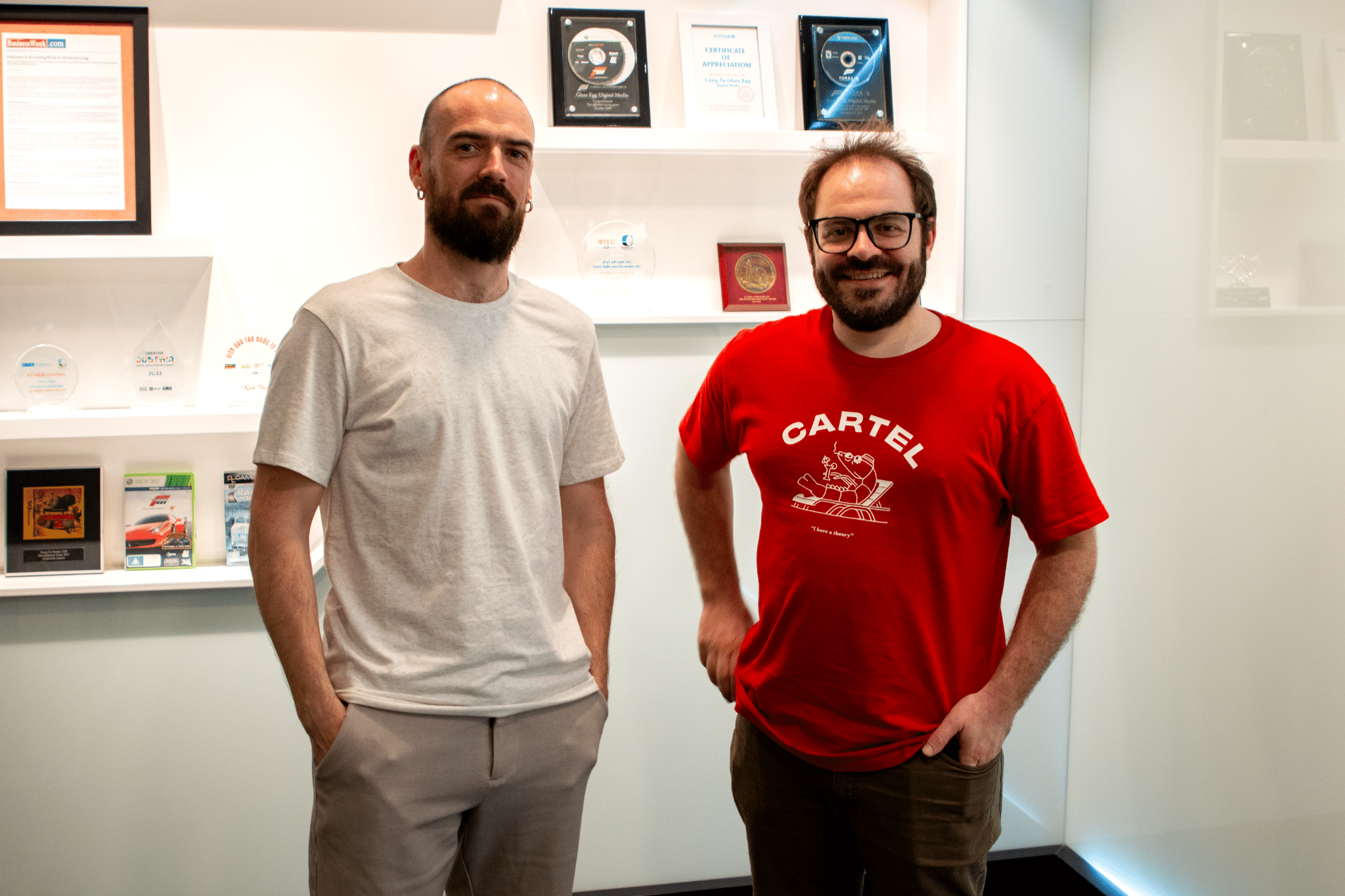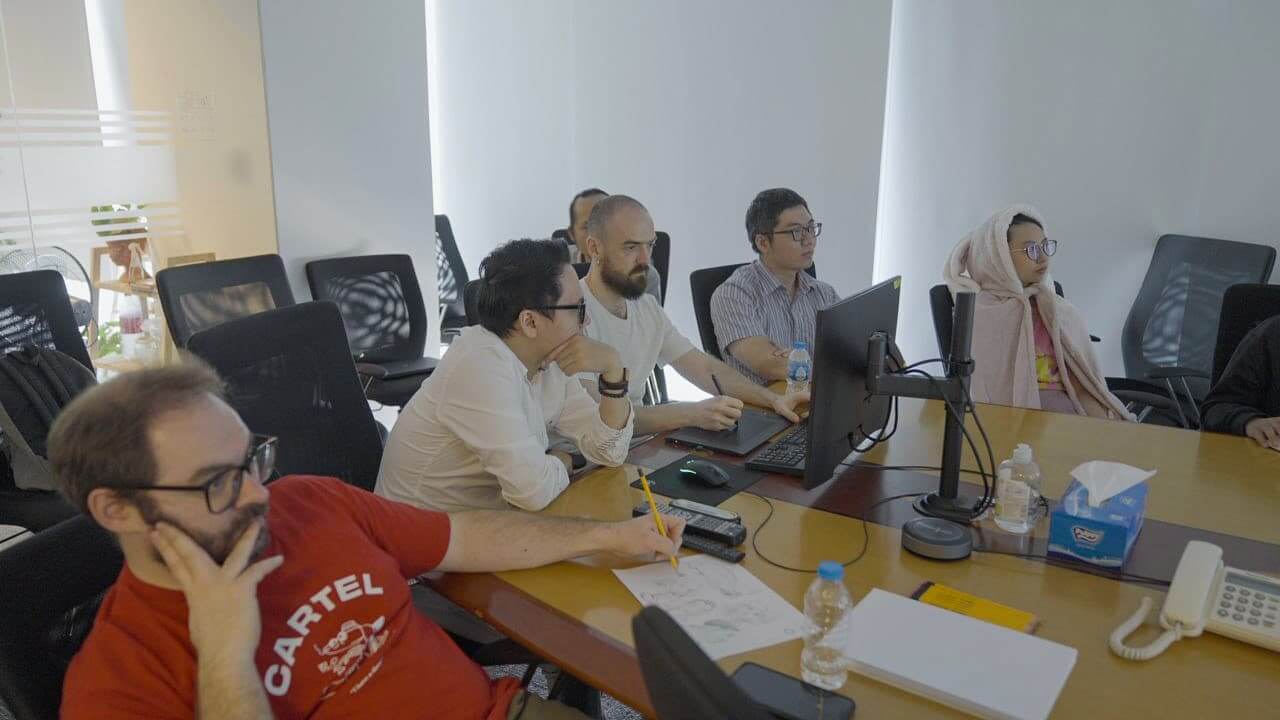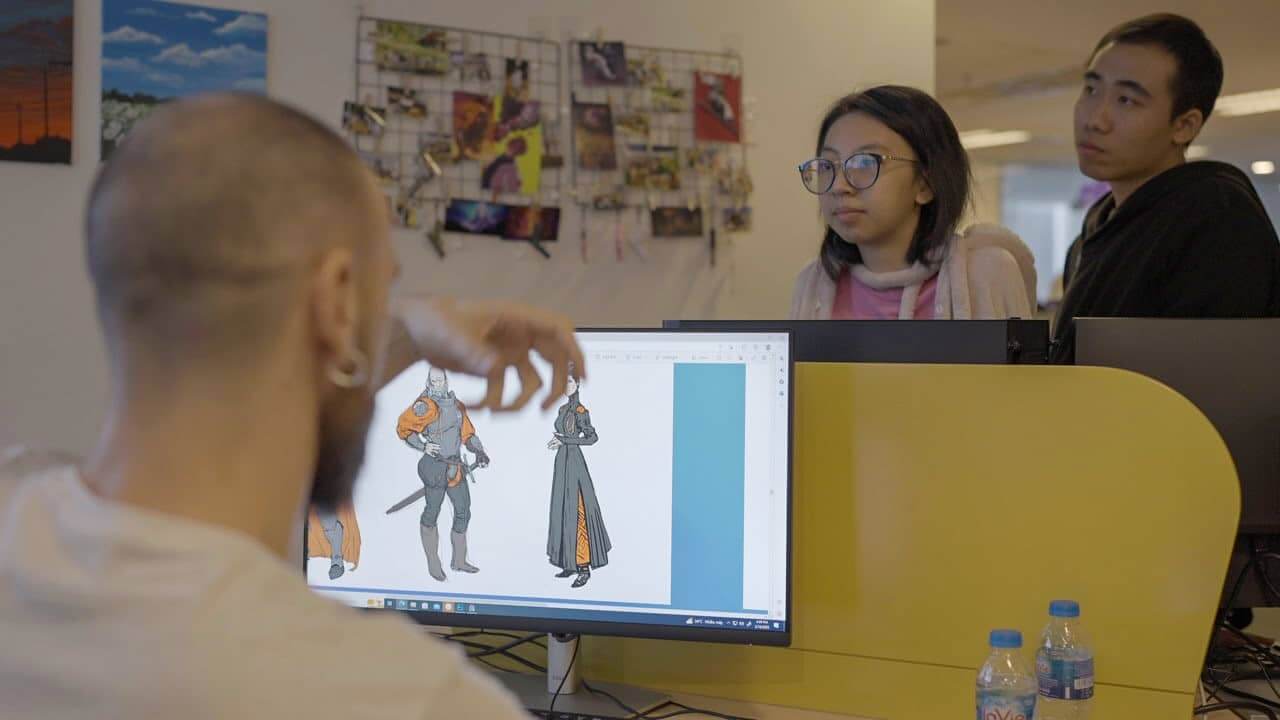This article is part of Virtuos Insider, a series of interviews where Virtuosi share about their careers and experiences in the company and video game industry at large. In this installment, we chat with our concept artists from Virtuos Montreal, Glass Egg – a Virtuos Studio, and Sparx* – a Virtuos Studio.
At Virtuos, our artists play a crucial role in making great games, and we invest heavily in developing effective and innovative training programs to help them master their craft. In February 2023, Nicolas Vallet and Quentin Gautier, Lead Concept Artists at Virtuos Montreal, travelled to Vietnam to host an internal training program for 17 of our artists at Glass Egg and Sparx*.

Quentin (left) and Nicolas (right)
To find out more about their takeaways from the two-week training program, we spoke to Nicolas, Quentin, and our colleagues at Glass Egg and Sparx*:
- Nicolas Vallet, Lead Concept Artist, Virtuos Montreal
- Quentin Gautier, Lead Concept Artist, Virtuos Montreal
- Bui Quang Hung, Concept Artist, Glass Egg
- Janice Phua, Concept Artist, Glass Egg
- Marina Ovchinnikova, Senior Artist, Sparx*
- Pham Huu Thinh, Junior Artist, Sparx*

Some of our artists who participated in the training program, and David Cheung (second from right, back row), General Manager at Virtuos Montreal
Tell us about how you got into concept art and video games!
Quentin: For as long as I can remember, I’ve always enjoyed imagining new worlds and drawing them to express everything that was going on in my head. Back in 1995, I read the art book for Ghost in the Shell and realized that art was my calling – this was what I wanted to do and how I wanted to make a living, and became a concept artist in 2009.
Janice: Like many artists, I started pretty young. I wanted to draw because I saw a lot of art around me from anime to games. When I was picking a college major, I learned that concept art was available and chose that without hesitation. Eventually, I was offered a position at Glass Egg a year ago and relocated to Vietnam – and here I am!
Marina: I actually didn’t think about concept art as a possible career path until I turned 24, and already had two engineering diplomas on me. I started having ideas about changing fields in my final year of university when I fell in love with video games and watching game livestreams. After that, I spent a year self-studying concept art before I found my first freelance job, and eventually ended up here through consistent effort!
Nicolas: Before video games, I worked as a concept artist for movies from 2009 and had the chance to work on several big projects. I was one of the designers for X-Men: Days of Future Past and was the lead artist on a Chinese movie called The Wandering Earth. In 2020, I switched to the games industry and started working at Virtuos Montreal.
Thinh: I studied graphic design initially but Overwatch heavily inspired me to pursue a career in games because I really loved their art style and characters. I decided to become a concept artist because I wanted to create that kind of experience for other gamers out there.
Hung: I didn’t intend to enter the games industry initially – I studied landscape architecture in university, but after playing lots of games and experiencing their stories and worlds, I realized that I wanted to be the person who creates these amazing worlds.
Nicolas and Quentin – what were your key objectives for this workshop before embarking on this trip?
Nicolas: During our pre-trip meetings with Glass Egg and Sparx*, our teams brainstormed a wishlist of topics to work on and discuss together – spanning from characters, vehicles, guns, and spaceships, to level design. We also did a lot of prep work before the trip to review the artists’ portfolios and understand which areas required more prioritization than others. My goal was to ensure that the artists participating in the workshop would know how to be more efficient and better organize their work at the end of the day.
Quentin: I focused a lot on broad principles and fundamentals during this training as my goal was to help our artists understand how to separate the problem-solving process in concept art into smaller steps. By teaching them how to separate problems and solve them separately in a sequence that made sense, they would be able to improve their efficiency as concept artists.
Nicolas: A lot of it was also focused on the fact that Virtuos offers end-to-end art services, so the work of a concept artist will change depending on what stage they are in a project. So, we approached this in a way that they could fit into the pipeline more seamlessly and eventually improve the quality of work delivered.

Nicolas talking about weapon design during one of the workshops
What were some of the things you wanted to learn in anticipation of this training program?
Thinh: I was very excited prior to this training as I knew I was about to meet and learn from veteran concept artists. I was already very excited just from reading their pre-training slides before they arrived. As expected, we had many meaningful exchanges about various topics, including hard surface design and new work approaches.
Marina: As I am not specialised in hard surface and weapon design, I really wanted to learn more and understand the logic behind the creation process. It was very interesting to learn the behind the scenes of creating hard surfaces and environments, new techniques and software, and to just sketch together.

In the midst of one of the concept art workshops
What’s the most interesting thing you’ve learned from the training sessions in the past two weeks?
Quentin: I was inspired by the overall enthusiasm of our artists and their will to learn. As an artist myself, it was really heartwarming to witness their passion and desire to improve their craft.
Also, it seemed as if any language barrier during the training evaporated once we got to drawing – art became our common language. If something couldn’t be understood through words, we could just pick up a pen and start drawing, and you could tell that everyone understood what you were trying to say right away.

Quentin having a discussion with Nguyen Ngoc Bao, Concept Artist (right) and Vo Xuan Tung, Art Director (back) from Glass Egg
Hung: To be honest, I was not expecting too much from the training at first as two weeks is relatively short. However, I learned a lot from Quentin, who guided us on how to analyze before starting our project and how to search for specific and precise references, which would save us so much time in the later stages of our work. It was really helpful for me.
Thinh: “Play with ideas” – that’s the most interesting thing I learnt from Nicholas. It sounds like an obvious lesson for us concept artists, but he really broke it down for us and demonstrated how we can actually play with ideas.
Janice: It was a very eye-opening experience for me as a junior artist, as there were mistakes that I’d make which I didn’t realize, but Nicolas and Quentin were able to identify them and give me advice to help me think differently. A senior artist’s experience and advice is really valuable.

Quentin, Janice, and Hung
How do such inter-studio exchanges complement your training and development and build rapport with teammates from other studios?
Marina: As Virtuos studios worldwide have different focuses and expertise, I think it’s essential to share knowledge between teams to help everyone grow and become stronger together. That could also potentially mean having more interesting and diverse projects for all of us.
To me, inter-studio training also helps us develop deeper connections as we spend days together talking about diverse topics and sharing our learning processes. I absolutely loved meeting our teammates from Virtuos Montreal and Glass Egg!
What’s one piece of advice you’d like to share with junior artists who have just started out?
Nicolas: Work on your fundamentals. To be a good concept artist, you need to understand your approach to design and to do that, you need to spend time designing. So it’s really good to work on finding your voice – use references, but also work on making your own thing.
Quentin: Being patient is super important. As a concept artist, a lot of your job is about failing and trying again, so patience is key. It’s also important to ask many questions and be curious. Being a good concept artist is more about your knowledge than technical skills.
Janice: Don’t be nervous, don’t be afraid to draw, and don’t put so much pressure on yourself. Just create art and enjoy the process!
Marina: Always strive for new knowledge and never stop learning. Basics are not boring but your best friend. And believe in yourself. If you genuinely love what you’re doing and constantly work to improve yourself, nothing is impossible.
Thank you, Nicolas, Quentin, Janice, Hung, Thinh, and Marina, for sharing your reflections and advice with us! If you’re interested to learn more about life as an artist at Virtuos, check out other Virtuos Insider articles or chat with us.

